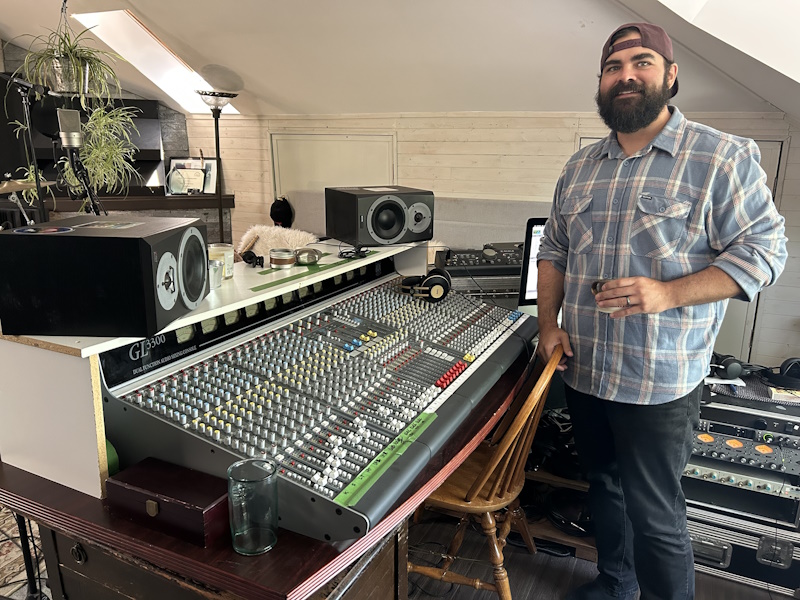In a quiet, unassuming lot tucked away on the western edge of Watrous, musical alchemy continues to happen at Skull Creek Studios. The studio has migrated from its southwestern Saskatchewan roots to the centre of the province where it’s been gaining serious traction as a production hotspot for emerging and established artists on the prairies.
It’s been three years since the Beveridge family purchased the house and land, and in that time, the community has embraced the venture, and the feeling is mutual. The relaxed atmosphere of the loft studio has become a Mecca for musicians and songwriters who find a creative, professional layout in an amazing natural environment of warmth and hospitality.
When talking about the evolution of Skull Creek Studios, you have to talk about the creative drive at the helm, Aspen Beveridge. The Beveridge family in its entirety carries a long music lineage, and Aspen will be the first to say that it would hardly have been possibly not to be hooked into music as a passion given his upbringing.
“It probably starts from birth,” Beveridge says, reflecting on his lifelong relationship with music. “My parents were immersed in music. My whole family was. As soon as I was old enough to hold an instrument, they put one in my hands.”
That instrument was the violin. Beveridge began his musical education around the age of five, eventually studying both old-time fiddle and classical violin. But his path was far from linear. A pivotal moment came during his classical studies at Medicine Hat College, when an encounter with an authoritarian violin teacher turned him off the instrument entirely. “He smacked my knuckles with his bow during a lesson,” Beveridge recalls. “Something changed in me. I was like, I’m done with this guy—and with this instrument.”
That experience led him, quite literally, down a new hallway, toward the sound of drums. He persuaded his parents to switch him to percussion lessons and soon found himself leaning into a rock-oriented style that would shape much of his musical identity.
While drums took center stage, a quiet but persistent interest in recording had already begun to emerge. His older brother Ben, a seasoned fiddler with touring experience, kept some recording gear in the house, ADAT machines and early tape equipment. Beveridge started tinkering with it on his own.
“No one really prompted me. I just started messing around,” he says. “I’ve always been drawn to music in general, whether it was the tech side, the instruments, or writing.”
By the time he reached his twenties, Beveridge had taken a detour through the University of Saskatchewan, where he played football for the Huskies. But even with academic and athletic commitments, music never left the picture.
“It took second place for a while,” he admits, “but it was always there.”
At a critical juncture, facing graduate school applications and a fork in the road, Beveridge felt a deep pull to fully commit to music. He scrapped his plans for a Master’s degree and instead applied to the Banff Centre for Arts and Creativity.
“I had this feeling in my soul that told me I can’t do this other thing. I need to do music in some capacity,” he says.
To his surprise, he was accepted. Only about 20 students from around the world are selected each year, and Beveridge found himself immersed in a world of professional mentorship and artistic excellence. It was here that he encountered Grammy-winning producer Shawn Everett, known for his work with Alabama Shakes, Bob Dylan, and Weezer.
“I was the only person there who was a diehard Weezer fan,” Beveridge laughs. That connection paid off; Everett invited him into a studio one night to listen to unreleased Weezer mixes.
“He asked for my opinion. He got me on the desk,” Beveridge remembers. “It just absolutely blew my mind - suddenly, I saw what was possible.”
That experience did more than boost his technical knowledge. It shifted his perspective.
“It gave me hope and made it a little more tangible,” he says. “Before that, it felt like it was out of reach, just too much of a fantasy.”
That sense of mentorship and access stuck with Beveridge. He now pays it forward through the Community Arts Mentorship Program, a charity initiative originally funded by Gord Downie and his wife.
“I try to be that person who opens the door,” he says. “This industry can be full of gatekeepers. I learned early that I don’t want to be like that.”
In Part Two of this series, we’ll explore how Beveridge built Skull Creek Studios from the ground up during a time of industry-wide contraction, stocking gear piece by piece, engineering albums at all hours, and helping launch some of Saskatchewan’s most promising talent.
Enjoy the entire Part One conversation with Aspen Beveridge of Skull Creek Studios.
